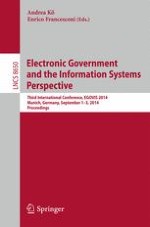This book constitutes the refereed proceedings of the Third International Conference on Electronic Government and the Information Systems Perspective, EGOVIS 2014, held in Munich, Germany, in September 2014, in conjunction with DEXA 2014. The 23 revised full papers presented together with one invited talk were carefully reviewed and selected for inclusion in this volume. The papers are organized in the following topical sections: identity management in e-government; e-participation; intelligent systems in e-government; semantic technologies in e-government; e-government cases; open government data and G-cloud; and privacy and security in e-government.
